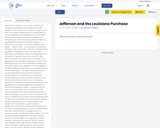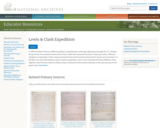
Description
Overview: In this lesson students will analyze a private letter that President Thomas Jefferson (1743–1826) sent to Robert Livingston (1746–1813), his minister plenipotentiary (ambassador) to France, regarding the negotiations for what would become the Louisiana Purchase. Livingston and James Monroe (1758–1831, 6th president of the US) negotiated the Louisiana Purchase Treaty. It is important to note that at the time this letter was written — April 18, 1802 — the area had not yet been offered for sale.
In this letter Jefferson, unaware of the possibility of outright purchase, focuses upon retaining commercial access to the Mississippi River and rights of deposit (economic access) in New Orleans. He also comments upon the danger of an aggressive France locating outposts just across the Mississippi River from the United States. While some historians characterize Jefferson as a Francophile, in this letter Jefferson sees France as a potential enemy to the United States.
This lesson allows students to contextualize what will become the Louisiana Purchase prior to its acquisition by viewing the Purchase through a lens of national economic and military defense rather than an act of territorial expansion. As Jefferson considers the possibility of an aggressive France led by Napoleon Bonaparte on America’s doorstep, he states, “…perhaps nothing since the revolutionary war has produced more uneasy sensations through the body of the nation.” Original spellings and punctuation are retained.
This lesson is divided into two parts, both accessible below. The text is accompanied by close reading questions, student interactives, and an optional follow-up assignment. The teacher’s guide includes a background note, the text analysis with responses to the close reading questions, access to the interactive exercises, and the follow-up assignment. The student’s version, an interactive PDF, contains all of the above except the responses to the close reading questions and the follow-up assignment.
Subject: Literature, Reading Informational Text, U.S. History Level: Middle School, High School Grades: Grade 11, Grade 12 Material Type: Interactive, Lecture Notes, Lesson, Primary Source, Reading Author: National Humanities Center Date Added: 05/03/2019
License: Creative Commons Attribution-NonCommercial 4.0 Creative Commons Attribution-NonCommercial 4.0 Language: English Media Format: Downloadable docs, Interactive
- Subject:
- American History
- History/Social Sciences
- Material Type:
- Primary Source
- Date Added:
- 11/27/2019

